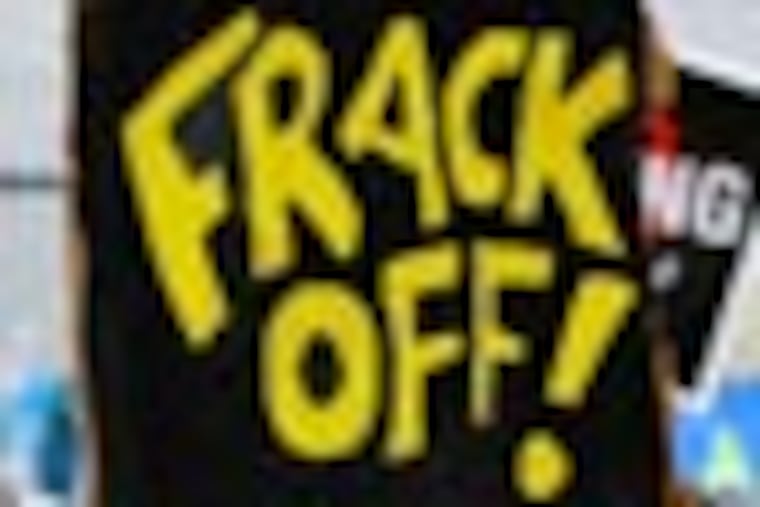'Fracktivists' protest at shale-gas conference in Philly
Hundreds of self-proclaimed "fracktivists" rallied and marched through Center City on Thursday afternoon, protesting the Shale Gas Insights conference and urging governments at all levels to ban the natural-gas-drilling process known as fracking.

Hundreds of self-proclaimed "fracktivists" rallied and marched through Center City on Thursday afternoon, protesting the Shale Gas Insights conference and urging governments at all levels to ban the natural-gas-drilling process known as fracking.
Opponents say the hydraulic fracturing process pollutes local aquifers, causes serious health problems, and will result in net job loss.
For more than two hours, speakers described what they called adverse effects of the process near their homes.
Tammy Manning of Susquehanna County said the gases around her well recently tested at 82 percent methane. She said she was told to leave the water running all the time because if the gas built up, it could cause her house to explode.
A spokesman for Energy in Depth, an industry-funded advocacy group, said that Manning lives in an area with historically high methane levels and that the problems on her property "are likely not attributed to Marcellus Shale development."
Carol French, a dairy farmer who lives 11/2 miles from a natural-gas drilling site in Bradford County, Pa., said her water often comes out white and turns gelatinous after sitting out for a half-hour. While the drilling company was at work, French said, her daughter became extremely ill, with bloody stool and enlarged organs.
Ray Kemble of Dimock, Pa., the town featured in the Gasland documentary, held up a jug that he said held water from his well that was the color of apple juice. According to government tests, he said, it is contaminated with weapons-grade uranium, arsenic, and other carcinogens.
Natural-gas companies deny that such effects can be tied to their operations. Many cases are being litigated.
As the speakers stepped up to the microphone, Shale Gas Insights attendees watched from above in a bay window of the Convention Center. "I hope they're scared," one protester said.
At one point, the several hundred protesters looked up and raised middle fingers to their audience.
A recent focus of the anti-fracking campaign is worker safety. Critics say companies expose workers to dangerous chemicals and force them to operate under unsafe conditions. In May, the New York Times reported that natural-gas companies were pressuring truck drivers to work 20-hour shifts.
Charlotte Bevins said she and her mother rose at 4 a.m. to drive to Philadelphia from West Virginia. Bevins said her brother Charles was supervising a forklift for a natural-gas contractor, at $13 an hour, last year. He was killed when the forklift sank into the mud, pinning him between the forklift and a building.
"After talking to his coworkers, they tell me there's no safe way to do this," Bevins said. "They're always using the cheapest, the quickest thing they can."
Bevins said her brother, a 23-year-old father of two, was working 15-day stretches with five days off in between.
After the rally, the protesters marched to the PNC Building to chant anti-fracking slogans. The event culminated in a speech in front of Gov. Corbett's Philadelphia office.
Thursday's protest was orderly and resulted in no arrests, and attendees were provided with food, water, and restrooms.
The protest was organized under the name Shale Gas Outrage by a coalition of social and environmental groups, including Protecting Our Waters, Delaware Riverkeeper Network, Food and Water Watch, and anti-fracking groups from Pennsylvania, New York, New Jersey, Delaware, and elsewhere.
Noreen McCarthy and her 12-year-old daughter, Erin, came from Pottstown to participate in the protest.
Erin, who is home-schooled, said she wanted to spread the message that hydraulic fracturing is "bad for the environment" - adding that the event was "really cool."